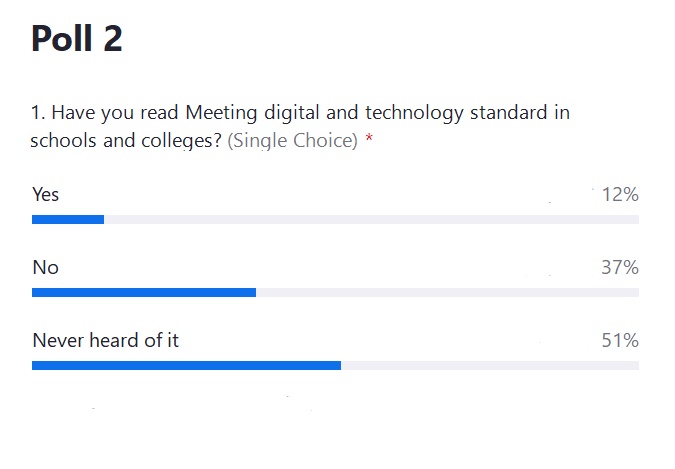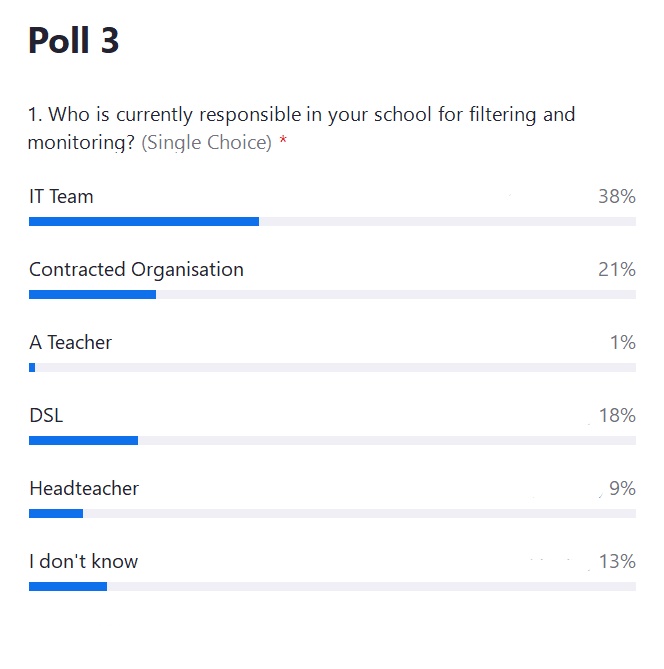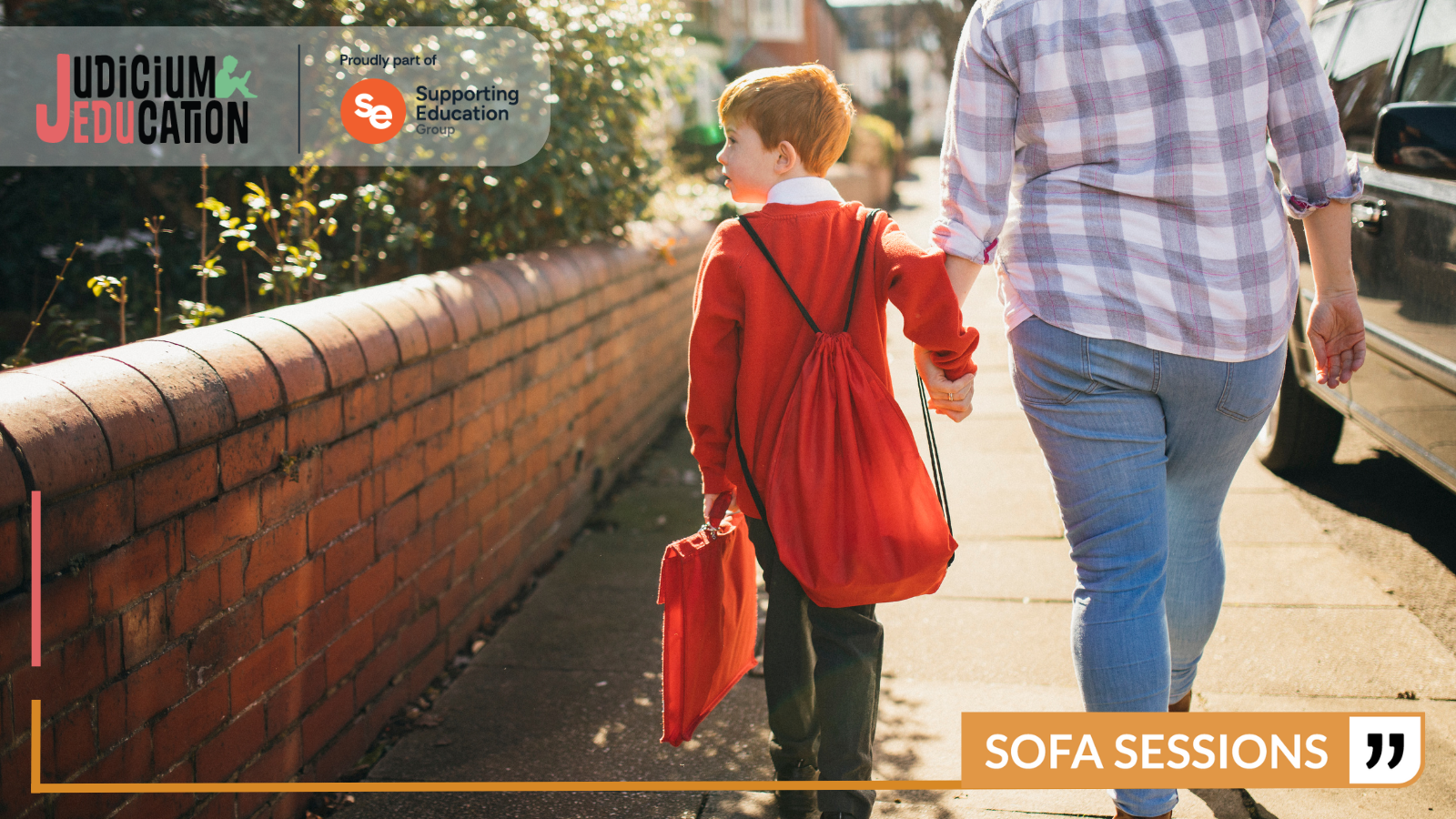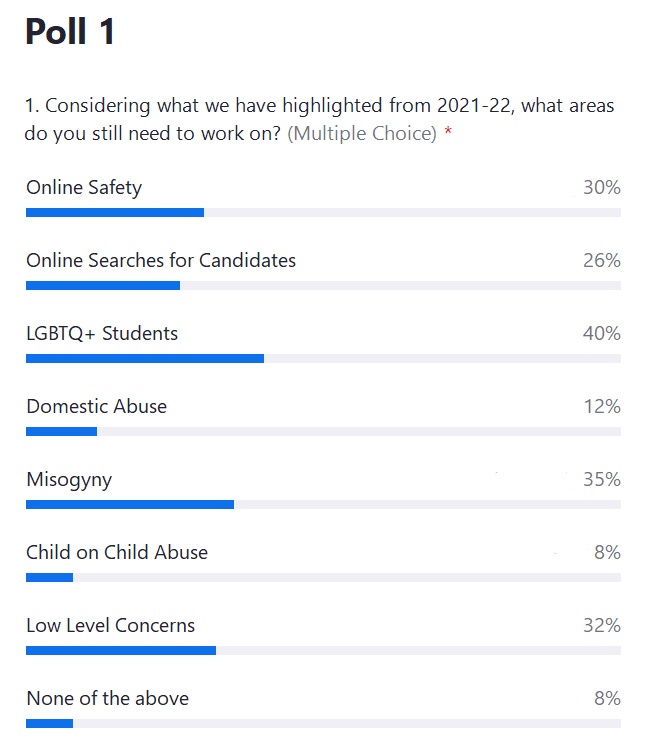Safeguarding: What to Expect from KCSIE 2023
_1000.png)
This blog is based on Judicium’s Safeguarding ‘Sofa Session’ from the 28th of June, with our resident expert Joanne Bocko. This session focused on fully embedding changes from last year’s KCSIE, key updates for the next academic year, and key considerations for your school or Trust.
Key Reminders for the Keeping Children Safe in Education (KCSIE) 2022 Updates
To ensure your school or Trust is fully compliant with the previous 2021-22 guidance, below are the key areas of changes:
- Online Safety Training- This is for All Staff and Governors.
- It shouldn’t be confused with cyber security or UK GDPR training. It relates to the online safety risks for students.
- Online Searches- Unfortunately, guidance hasn’t been clear as to the extent of these checks. You also must consider transparency and legalities.
- Our recommendation is a cursory search engine search for their name, location and ‘images’ is sufficient.
- This stemmed from a case review in which a TA gained a position in school, but news articles about her revealed she was convicted of a child death in Spain.
- You are looking to catch obvious things, not interrogate an individual’s interests.
- Support for LGBTQ+ Students – Ensuring they are supported and know who to speak to.
- This may vary across schools from worry boxes to LGBTQ+ groups, celebration of diversity, Pride week, etc.
- Additional Guidance on Domestic Abuse
- Awareness from the Domestic Abuse Bill that all children are now considered to be ‘victim’s where they witness domestic abuse.’
- Linking RSHE with Misogyny – Many schools are aware of influencers such as Andrew Tate or Incels. These misogynistic ideologies should be considered within our wider Prevent and British Values lessons.
- Change from Peer-on-Peer Abuse to Child-on-Child Abuse
- Low-level Concerns - Do all staff know what these are and how to report them?
Poll 1
KCSIE 2023
Keeping Children Safe in Education 2023 was released on 7th June. For this edition, no consultation took place with school settings. Generally, the changes are minimal with the length of the document still sitting at 179 pages which is still a great deal to comply with.
However, there is new learning to discuss. A few reminders are:- The DSL, Deputies and the Governing or Trustee body should read the whole document.
- Those in Regulated Activity, who work directly with children, must read at least Part One
- Those who do not work directly with children must read either Part One or Annex A.
- Annex B contains important additional information about specific forms of abuse and safeguarding issues. School leaders and those staff who work directly with children should also read Annex B.
KCSIE use the terms “must” and “should” throughout the guidance. They use the term “must” when you are legally required to do something and “should” when the advice set out should be followed unless there is good reason not to. As a senior leader, you will be responsible for making these decisions and justifying why something has not been followed through. We recommend these decisions are recorded in writing.
What are the Key KCSIE Updates for 2023?
- Children absent from education has been added alongside children missing from education.
- This emphasises those absent on repeat occasions or for prolonged periods and appropriate safeguarding arrangements are put in place.
- It is important the school or college’s response to persistently absent pupils and children missing education supports identifying abuse, and in the case of absent pupils, helps prevent the risk of them becoming a child missing education in the future.
- For further information, see working together to improve school attendance (Sept 2022), as it will give some context to the additional wording.
- All staff should receive online safety training which includes an understanding of the expectations, applicable roles and responsibilities in relation to filtering and monitoring.
- Your school or Trust’s Child Protection Policy should reference appropriate filtering and monitoring on school networks. This now needs to be included in your safeguarding policy too.
- Link to Keeping Children Safe in Out of School Settings guidance.
- Guidance ‘Keeping Children Safer during community activities, after school clubs and tuition.'
- This is non-statutory guidance for providers running out of school settings.
- Have facilities staff, or site managers review this guidance. Ensure your letting arrangements align with the guidance.
- There is a new paragraph added explaining how all concerns about individuals who visit the school (contractors, third party professionals, etc.) would follow the same LADO procedures as those who work for the school.
- Clarifying it is good practice for schools to make candidates aware online searches will be carried out.
- Updated link to Behaviour in Schools Guidance (2022). It recognises the increased link between safeguarding and behaviour.
- Filtering and monitoring standards
Filtering and Monitoring
Filtering and monitoring has become more prominent over the years. The case of Frankie Thomas in 2018 demonstrated how poor filtering and monitoring can impact children. Tragically, Frankie was able to access self-harm material on school networks before taking her own life.
But what is filtering and monitoring?
Filtering blocks students from accessing harmful content.
Monitoring can either provide a live script of what students are looking at and searching for or provide a report of a computer session/traffic on the school network. This may also include word documents and chat messages.
The DfE document ‘Meeting digital and technology standard in schools and colleges’ was published in March 2022 and has been updated in March 2023. It is the key tool used to judge filtering and monitoring standards.
Polls 2 & 3


Technical Requirements for Meeting Standards
The SLT are responsible for:- Procuring filtering and monitoring systems.
- Documenting decisions on what is blocked or allowed and why.
- Reviewing the effectiveness of your provision.
- Overseeing reports.
- Ensuring staff understand their role with filtering and monitoring and are appropriately trained to understand systems. For instance, staff should have an awareness of what school has in place, an awareness of what filtering and monitoring should achieve, what should be blocked and how to raise concerns about the system.
- Following policy and procedure.
- Acting on reports and concerns.
- Assign a member of SLT and a Governor to be responsible for ensuring that filtering and monitoring standards are met. It would make sense for the safeguarding Governor to be the lead Governor.
The day-to-day management of filtering and monitoring systems requires the specialist knowledge of both safeguarding and IT to be effective. The DSL should work closely together with IT service providers to meet the needs of your setting.
The responsibility for filtering and monitoring is being placed squarely within the school and safeguarding team. At Judicium we often see schools contract this responsibility to another organisation and hope it is being dealt with. Schools need to ensure that they are: confident with how their systems work, flags and filtering are relevant to their setting and the current climate, concerning searches are flagged urgently and acted upon quickly and appropriately. The wider school staff are also responsible and should have a basic understanding of these systems.
We recommend you review your filtering and monitoring system annually, due to the everchanging climate of the online world. It could be part of a wider online safety review.
Top tips for filtering and monitoring
- You should identify and assign roles and responsibilities to manage your filtering and monitoring systems.
- You should review your filtering and monitoring provision at minimum annually.
- Your filtering system should block harmful and inappropriate content, without unreasonably impacting teaching and learning.
- You should have effective monitoring strategies that meet the safeguarding needs of your school or college.
Key Takeaways from the KCSIE Update 2023
- Ensure all actions from 2022 are in place.
- Allocate a Governor and members or SLT (likely will just be DSL and safeguarding Governor), preferably someone on the safeguarding team to take lead responsibility for filtering and monitoring.
- Include filtering and monitoring in staff training at inset and induction training.
- Include filtering and monitoring in your safeguarding policy.
- Add children absent from education, alongside children missing in education and consider safeguarding approaches to these students.
Previous Sofa Session Notes on Prevent/Incel
You can follow us on Twitter: @JudiciumSG @JudiciumEDU
Safeguarding eLearning Courses
If you’d like to review Judicium’s forthcoming sofa sessions please click here
© This content is the exclusive property of Judicium Education. The works are intended to provide an overview of the sofa session you attend and/or to be a learning aid to assist you and your school. However, any redistribution or reproduction of part or all of the contents in any form is prohibited. You may not, except with our express written permission, distribute or exploit the content. Failure to follow this guidance may result in Judicium either preventing you with access to our sessions and/or follow up content.
Related content

This blog is based on Judicium’s Safeguarding ‘Sofa Session’ from the 4th February 2026, with our resident experts Joanne Bocko and Sarah Cook.
.png)
This is a summary from Judicium’s Safeguarding and Thrive ‘Sofa Session’ from 3rd December, with our Judicium Safeguarding consultant Joanne Bocko, Thrive Head of Innovation and Principal Trainer, Viv Trask-Hall and Director of Thrive, Tom Preston. Drawing on decades of combined experience in safeguarding, governance, SEND, leadership, and mental health, the panel unpacked how the framework’s shifts will impact schools, what Ofsted will be looking for, and how leaders can position themselves for success.

This is a summary taken from Judicium’s SEND and Safeguarding ‘Sofa Session’ from 5th November, with our Safeguarding and SEND consultants Rik Chilvers and Simon Hanley. In this session we discuss the new SEND and Safeguarding toolkit and how to best prepare for an Ofsted visit.
.png)
This blog is based on Judicium’s Safeguarding Client Survey Uncovered - Insights from the sofa session from 8th October with our Safeguarding Consultant Joanne Bocko.
.png)
This blog is based on Judicium’s Safeguarding - Back to school: Are you KCSIE ready? sofa session from 10th September with our Head of safeguarding, Kate Massey . In this session we take a look at the key updates for KCSIE 2025, and how best to prepare for the start of the new academic year.

This blog is based on Judicium’s Safeguarding Supervision On The Sofa: Your DSLs Safe Space ‘Sofa Session’ from the 25th June 2025, with our resident experts Helen King and Sarah Cook.


Sofa Sessions | Safeguarding